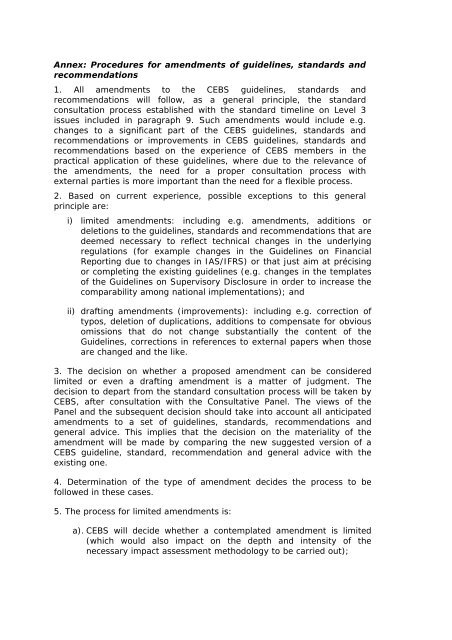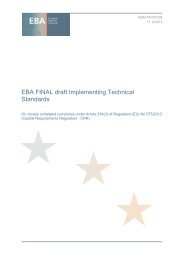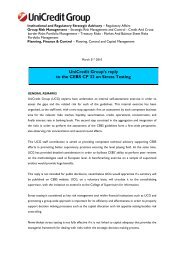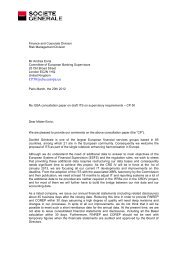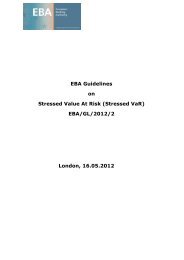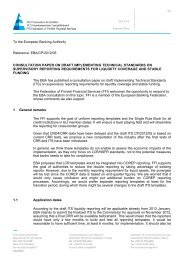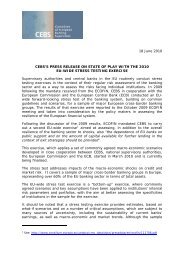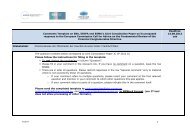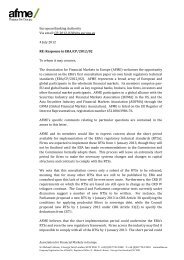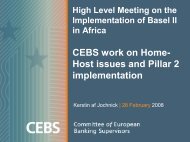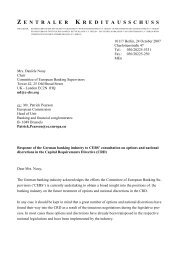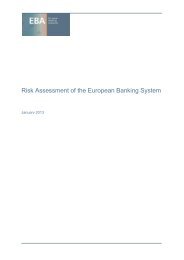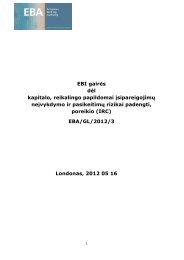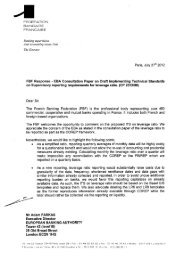CP01 revised - European Banking Authority
CP01 revised - European Banking Authority
CP01 revised - European Banking Authority
Create successful ePaper yourself
Turn your PDF publications into a flip-book with our unique Google optimized e-Paper software.
Annex: Procedures for amendments of guidelines, standards and<br />
recommendations<br />
1. All amendments to the CEBS guidelines, standards and<br />
recommendations will follow, as a general principle, the standard<br />
consultation process established with the standard timeline on Level 3<br />
issues included in paragraph 9. Such amendments would include e.g.<br />
changes to a significant part of the CEBS guidelines, standards and<br />
recommendations or improvements in CEBS guidelines, standards and<br />
recommendations based on the experience of CEBS members in the<br />
practical application of these guidelines, where due to the relevance of<br />
the amendments, the need for a proper consultation process with<br />
external parties is more important than the need for a flexible process.<br />
2. Based on current experience, possible exceptions to this general<br />
principle are:<br />
i) limited amendments: including e.g. amendments, additions or<br />
deletions to the guidelines, standards and recommendations that are<br />
deemed necessary to reflect technical changes in the underlying<br />
regulations (for example changes in the Guidelines on Financial<br />
Reporting due to changes in IAS/IFRS) or that just aim at précising<br />
or completing the existing guidelines (e.g. changes in the templates<br />
of the Guidelines on Supervisory Disclosure in order to increase the<br />
comparability among national implementations); and<br />
ii) drafting amendments (improvements): including e.g. correction of<br />
typos, deletion of duplications, additions to compensate for obvious<br />
omissions that do not change substantially the content of the<br />
Guidelines, corrections in references to external papers when those<br />
are changed and the like.<br />
3. The decision on whether a proposed amendment can be considered<br />
limited or even a drafting amendment is a matter of judgment. The<br />
decision to depart from the standard consultation process will be taken by<br />
CEBS, after consultation with the Consultative Panel. The views of the<br />
Panel and the subsequent decision should take into account all anticipated<br />
amendments to a set of guidelines, standards, recommendations and<br />
general advice. This implies that the decision on the materiality of the<br />
amendment will be made by comparing the new suggested version of a<br />
CEBS guideline, standard, recommendation and general advice with the<br />
existing one.<br />
4. Determination of the type of amendment decides the process to be<br />
followed in these cases.<br />
5. The process for limited amendments is:<br />
a). CEBS will decide whether a contemplated amendment is limited<br />
(which would also impact on the depth and intensity of the<br />
necessary impact assessment methodology to be carried out);


